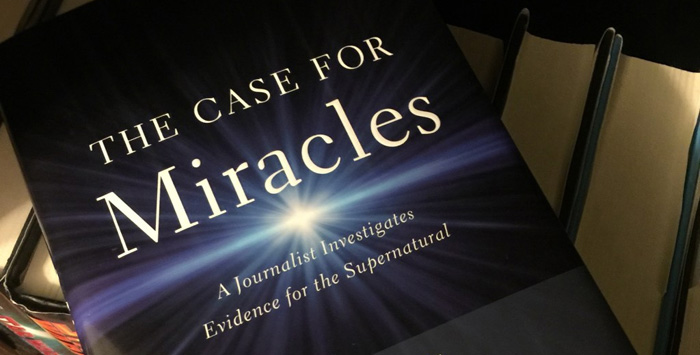What is a miracle? Have miracles happened? Do they occur today? Should we believe miracle reports?
If you have seriously wondered about these sorts of questions, then I recommend Lee Strobel’s new book: The Case for Miracles: A Journalist Investigates Evidence for the Supernatural (Zondervan 2018).
Strobel, a former atheist but now Christian, begins the book by interviewing Michael Shermer, a former Christian but now skeptic. Shermer has degrees in psychology and biology, plus a doctorate in the history of science, and is publisher of Skeptic magazine. Shermer argues against miracles.
At first, Shermer’s arguments seem strong. But then Strobel takes an investigative journey (like he does in his other “Case for…” books) to talk with experts who disagree.
Here are some highlights.
Concerning Shermer’s appeal to a famous argument against belief in miracles by Scottish skeptical philosopher David Hume (1711-1776), Strobel interviews New Testament scholar Craig Keener, author of the massive two-volume Miracles (Baker Academic 2011).
It turns out Hume’s argument is question-begging: it assumes as established what is at issue – it sneaks the conclusion into the premises. Hume assumes miracles are maximally improbable, so all miracle reports are always unbelievable. But, unnoticed by Hume, whether miracles are improbable and whether miracle reports are credible are issues only open-minded investigation can resolve.
In other words, Hume’s argument fails – miserably. (I can attest to the correctness of this verdict, since I studied Hume’s argument for my master’s and doctoral degrees in philosophy.)
Significantly, Hume’s (and Shermer’s) claim that there aren’t well-attested-to miracles is simply false. In Strobel’s interview with Keener, Keener sets out a wonderful summary of his aforementioned two-volume study. There is in fact much good evidence – sometimes excellent evidence – that miracles have occurred in the past and even today.
Concerning Shermer’s appeal to a so-called “gold standard” prayer study that allegedly debunks the effectiveness of prayer, Strobel interviews Candy Gunther Brown, who has three degrees from Harvard and is professor of religious studies at Indiana University.
It turns out that the study touted by Shermer is faulty. The people praying included a group that “doesn’t believe in miracles, doesn’t believe in a personal God outside of us who intervenes in people’s lives, and doesn’t believe it’s even appropriate to ask for supernatural help.”
According to Gunther Brown, two other studies that include prayers from actual believers contradict Shermer’s favoured but flawed study. In these studies healings seem very much to take place in answer to prayer, especially if the prayers follow the pattern set out by the New Testament. Gunther Brown’s conclusion: “Something is going on, and it surely warrants further investigation.”
In a chapter on dreams and visions, Strobel interviews Tom Doyle, a missionary to Muslims. Many Muslims today are having “high-definition Jesus dreams” that draw them to accepting Jesus as Lord.
When asked whether it’s more reasonable to believe that these dreams are mere coincidence and not supernatural, Doyle responds, “That would take a lot more faith to believe.”
Strobel also looks at the universe as a miracle writ large. In an interview with University of Oklahoma physicist Michael Straus, Straus makes the case that the big bang beginning of the universe coupled with its fine tuning points to God. Straus addresses the objection that multiverse theory explains the fine tuning (it doesn’t because it lacks evidence) and the objection “Who made God?” (nobody did).
On the resurrection of Jesus, Strobel interviews J. Warner Wallace, a former atheist and cold-case detective. Wallace argues that the evidence for Jesus’ miraculous resurrection is strong. Even compelling (if one doesn’t question-beg à la Hume).
Another chapter is titled “When Miracles Don’t Happen.” Strobel interviews Denver Seminary philosopher Douglas Groothuis, whose wife has dementia. This is a tough chapter to read, because both Groothuis and his wife are suffering terribly, and God seems silent.
Nevertheless, Groothuis holds that the positive evidence for Jesus’ miraculous resurrection is strong – and gives hope to him and Becky.
In sum, Strobel’s book well handles positive evidence for miracles and tough objections. I commend it to believers and skeptics alike.
Hendrik van der Breggen, PhD, is a retired philosophy professor who lives in Steinbach, Manitoba.




